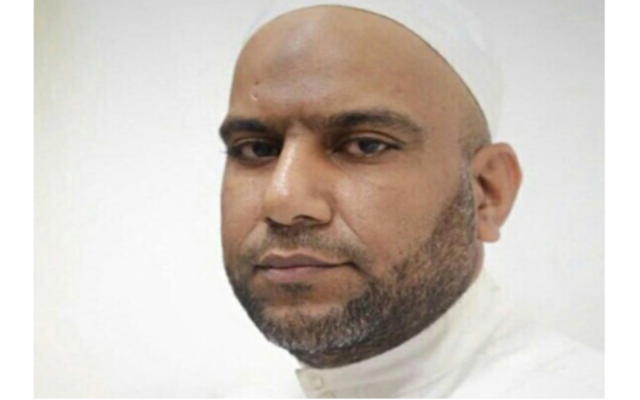7 December 2016 – Since 24 October, the Government of Bahrain has arbitrarily detained Sayed Alawi Hussein Alawi in the Criminal Investigations Department (CID), where he remains in detention. Sayed Alawi’s family has filed multiple complaints regarding his case to Bahraini officials, and continue to fear that Alawi is subjected to torture. We, the undersigned, condemn his continued arbitrary arrest and ill-treatment, and call on the authorities to immediately launch a thorough and transparent investigation into his case.
Concerns over possible ill-treatment and torture have emerged in Sayed Alawi’s case. Alawi was interrogated without the presence of his lawyer and his family have been barred from seeing him. Following his prolonged initial disappearance, his family reported that Alawi sounded “weak,” “exhausted,” and “barely able to speak” over the phone. Bahrain’s oversight bodies, which have failed to establish their independence from the Ministry of Interior or Public Prosecution, have been reluctant to investigate. These conditions contribute to Alawi’s family’s fears that he is subjected to ill-treatment and torture.
Sayed Alawi, from Duraz, was arrested at his workplace on 24 October 2016. Multiple cars reportedly surrounded Alawi’s worksite, raided his office, confiscated his electronic devices, and then took him to an undisclosed location.
Since the time of his arrest, Sayed Alawi’s wife, Majeeda, has not been permitted to visit her husband. Officials at the Criminal Investigations Department repeatedly denied his location there during his disappearance. She tried on multiple occasions to confirm his location. She visited the CID – where criminal investigations are conducted, and the site commonly identified as a location of torture in Bahrain – on 26 October, but was told he was not there. She visited again on 1 November, and officials refused to confirm or deny his location.
On 3 November, Majeeda received a call from the CID informing her that he was in Dry Dock Detention Center, Bahrain’s primary pre-trial detention facility. Dry Dock officials instructed her to visit on 6 November. When she arrived, the authorities informed her that Sayed Alawi was not held there. On the following day, a lawyer told the family that Sayed Alawi had been presented before the Public Prosecution and subsequently transferred back to Dry Dock. The next day on 8 November 2016, the family again travelled to Dry Dock to see Sayed Alawi. For the second time, Dry Dock officials denied Sayed Alawi’s presence at the facility. Authorities refused to give the family information about Sayed Alawi’s whereabouts.
The family did not receive any confirmation of his location for over a month, and finally received a phone call from Sayed Alawi 36 days after his arrest, days after Majeeda took her story to the local press. During the call, Alawi’s voice was reportedly weak and sounded exhausted, and he was not able to speak.
Sayed Alawi’s family has submitted multiple complaints to the Ombudsman and the Special Investigation Unit, institutions trained and supported by the United Kingdom tasked with investigating police abuse. Majeeda filed a case with the Ombudsman following his disappearance, but the office was unable to provide her with updates on his case and whereabouts. She subsequently filed a second complaint alleging torture, which the office accepted after his family persisted for several days.
Sayed Alawi’s case fits a pattern of arbitrary arrest and ill-treatment which has been repeatedly documented in Bahrain over several years. The CID continues to be identified as a center of torture in Bahrain, particularly during pre-trial detention. Bahrain’s criminal justice system relies primarily on confessions, which encourages ill-treatment amounting to torture in pre-trial detention.
The UK has provided over £5m in funds towards “technical assistance” to Bahrain since 2012. In June 2016, BIRD found this policy to be “counterproductive” and “unsustainable”, having funded the establishment of bodies which whitewash violations, without adequately helping victims. The UK has provided training to the Special Investigations Unit and the Police Ombudsman. On 6-7 December, the British Prime Minister visited Bahrain for the Gulf Cooperation Council Leaders Summit, and Sayed Alawi’s family publicly called on her to raise his case.
A 2015 report by Human Rights Watch, with assistance from the Bahrain Institute for Rights and Democracy, found that “Bahraini security forces continue to torture detainees using methods identical to those documented by BICI investigators in 2011, and by Human Rights Watch in 2010.”
We, in the Bahrain human rights community, are deeply concerned that Bahrain’s accountability mechanisms, including the Ombudsman and SIU, continue to demonstrate reluctance in providing accountability and effective preventative measures in reducing abuse. We call for the immediate release of Sayed Alawi and for an immediate investigation into arrest, detention and possible ill-treatment, as well as prosecution of all officials responsible for abuse.
Signed,
Americans for Democracy & Human Rights in Bahrain
Bahrain Center for Human Rights
Bahrain Institute for Rights and Democracy
European Centre for Democracy and Human Rights





